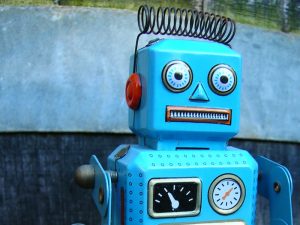In a just a decade or too, artificial intelligence has gone from science fiction fantasy to an everyday reality for many of us. Do you have a smartphone with Siri or Google Assistant baked in? Perhaps an Amazon Echo standing on a bookcase back home? Those disembodied voices, linked over the internet to a vast network of servers and self-propelled neural networks, are AI – and they are moving ever closer to passing the legendary Turing Test.
Of course, none of these products are genuinely self-aware, in the broadest sense of the term ‘intelligent’. But that is coming (probably). Popular futurologist Ray Kurzweil, who now works for Google, believes we will achieve the so-called ‘singularity’, the point at which artificial intelligence overtakes the human variety, in just a few decades’ time. That’s either an exciting or scary prospect, depending on how you look at it.
But what does the gradual spread of AI mean for us today? Physical factory robots have existed for decades, freeing people from the most repetitive and wearisome tasks but at the same time causing job losses. Since then they become ever sophisticated, and their development has run alongside the growth of AI. Now we find ourselves at a point when a notable number of non-factory positions are also under threat from machines – more than at third of administrative and support service positions for example, and just under a third of financial and insurance positions. Finance, in particular, has taken with enthusiasm to AI: many loan and insurance assessments are made by machines, and stockbroking is now hugely automated, with computers buying and selling shares between themselves at tremendous speeds and with little human intervention.
This will only continue, so is there anything we can do? Is it possible to future-proof your job and keep the robots from the door? The first thing to realize is that AI, at least in its current form, can only do certain things, and all that must be rigidly programmed in. AI cannot be creative, think spontaneously, or tackle the multiple intricacies of social interaction: although scientists and engineers are doing their very best to teach them all those things. But it’s a tough task: these are all tremendously difficult things for machines to grasp. No matter how polished a user experience they produce, AI is, fundamentally, a product of computing, and that in turn boils down at the deepest level to binary ones and zeros. Not very human.
So the more human your job is, the safer it will be is from AI: for now, anyway! But what if you work in a field that is vulnerable to the rise of the robots – for example, transportation, wholesale distribution or manufacturing? The best approach is perhaps to accept that the robots will be always better at repetition and heavy lifting, and AI will always be better at crunching numbers. Instead, move sideways and adapt to the new opportunities that will present themselves. Learn to repair the robots or programme the AI. Become a manager or supervisor – a position no robot can take. Or move into a customer facing role and specialize in all that tricky social interaction.
For all its continuous evolution and intricacy, AI is still characterized as much by what it can’t do as what it can. As HAL famously put it, “I’m sorry Dave, I’m afraid I can’t do that…” We humans aren’t redundant just yet!











